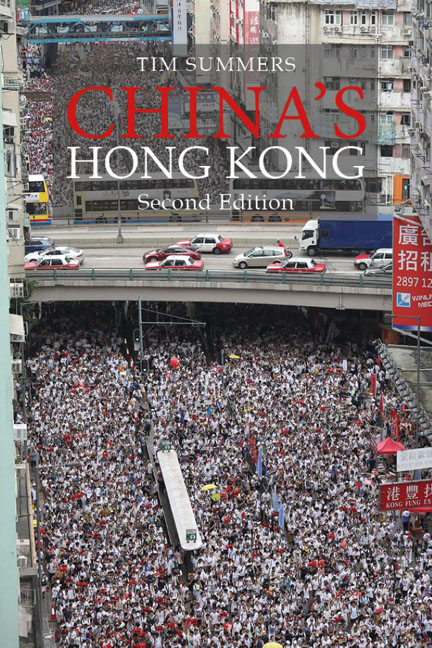Book contents
- Frontmatter
- Contents
- Preface to the second edition
- Note on transliteration
- Glossary and abbreviations
- Map
- Introduction
- 1 Hong Kong before 1997
- 2 Implementing the handover settlement
- 3 Hong Kong’s economy, globalization and the rise of China
- 4 The Occupy movement and its aftermath
- 5 International dimensions of the Hong Kong SAR
- 6 A year of protest
- 7 Hong Kong’s future
- Timeline: Key dates in Hong Kong’s political history
- Notes
- Index
4 - The Occupy movement and its aftermath
Published online by Cambridge University Press: 20 December 2023
- Frontmatter
- Contents
- Preface to the second edition
- Note on transliteration
- Glossary and abbreviations
- Map
- Introduction
- 1 Hong Kong before 1997
- 2 Implementing the handover settlement
- 3 Hong Kong’s economy, globalization and the rise of China
- 4 The Occupy movement and its aftermath
- 5 International dimensions of the Hong Kong SAR
- 6 A year of protest
- 7 Hong Kong’s future
- Timeline: Key dates in Hong Kong’s political history
- Notes
- Index
Summary
The events of the autumn of 2014 catapulted Hong Kong back to international attention, over 17 years after the world's media had last flocked to the city for the handover ceremonies. The eruption of protests in Hong Kong's central business district and other spots around the SAR turned out not to be another of the many short-lived protests that Hong Kong had seen on a regular basis, but a 79-day “occupation” of streets which were more used to taxis, buses and cars than pedestrians and the tents of protestors.
This was the “Occupy” movement, dubbed by some of its supporters as the “umbrella revolution” or “umbrella movement” after the symbol adopted by protestors who had used umbrellas to ward off police pepper sprays early on in the demonstrations. Between the end of September and the middle of December there were standoffs between protestors and the police. Key arteries in the main business district were turned into impromptu campsites, which hosted mini lecture series, first aid points, rubbish collection and recycling, and a proliferation of political slogans. Wit and creativity, as well as obscenities – not uncommon characteristics of Cantonese language – featured in protesters’ slogans. Meanwhile, after the initial clashes and use of tear gas, a heavy police presence watched cautiously over developments, anxious on the most part to avoid more confrontation than necessary.
Around protesters and police, Hong Kong's business and financial elites and those who provided the daily services of the city's economy went about their usual business as best they were able, alert to possible developments on the streets. Occupy did not paralyze Hong Kong, and away from the protest areas, life was pretty much unaffected, with social media and local news bulletins providing regular updates from the protest frontline.
But this was an unprecedented time in Hong Kong, and one which would prove to be a turning point in the city's politics.
The immediate catalysts for these protests was the thorny question of political and constitutional reform, this time focused on the question of how the chief executive should be chosen in 2017 and beyond. But more lay behind the protests.
- Type
- Chapter
- Information
- China's Hong KongThe Politics of a Global City, pp. 77 - 102Publisher: Agenda PublishingPrint publication year: 2020



